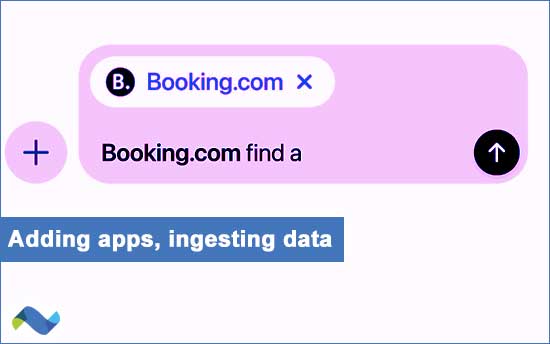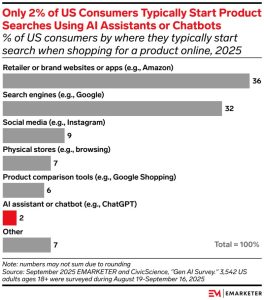CHATGPT CONNECTING APPS
ChatGPT adding apps, ingesting data
OpenAI announced during its Developer Day yesterday that it will let developers build apps that work inside ChatGPT.
The Verge reported, “The idea is that, from within a conversation with the chatbot, you can essentially tag in apps to help you complete a task while ChatGPT offers context and advice.”
Let the data flow, and while it does, OpenAI’s Large Language Model will only get smarter.
The Verge continued, “Apps available inside ChatGPT starting today will include Booking.com, Canva, Coursera, Expedia, Figma, Spotify, and Zillow. In the ‘weeks ahead,’ OpenAI will add more apps, such as DoorDash, OpenTable, Target, and Uber.”
- “Introducing apps in ChatGPT and the new Apps SDK” (October 6) – OpenAI
- Read more from The Verge. (October 6)
- See use cases: OpenAI on X (October 6)
OpenAI’s Head of ChatGPT Nick Turley said on LinkedIn yesterday:
“I still remember our first OpenAI Developer Day in 2023.
Back then, we had 2 million developers and 100 million weekly ChatGPT users, and we were processing about 300 million tokens per minute on our API.
Today, 4 million developers have built with OpenAI, more than 800 million people use ChatGPT every week, and we process over 6 billion tokens per minute on the API.”
From tipsheet: So many implications in this announcement…
- OpenAI’s ChatGPT is becoming an app store, of sorts, which could give Apple, with its App Store, pause. Will consumers default to ChatGPT to access their favorite sites/apps?
- And with all this data flowing, advertising should be a “slam dunk” for OpenAI’s algos.
- Also, OpenAI may end up taking a rev share with these apps somehow, some way.
- There appear to be implications for retail media networks, too. The Target app in ChatGPT?
- Finally, ad tech and martech apps (planning, campaign management, etc.) on ChatGPT? – it’s only a matter of time. OpenAI’s APIs have been reaching out to ad and marketing tech. Now, OpenAI brings ad and martech’s customers to the answer engine interface.
AI TRANSFORMS APP
Duolingo focuses on AI, adds ad network
Language app Duolingo is about to launch its own mobile ad network. Adweek’s Trishla Ostwal said the company has been using DSP tech from Google’s Ad Mob for its free tier of language learning since 2015. Now, the publicly-traded company is expanding its ad strategy.
Ostwal wrote:
“The shift comes as Duolingo leans heavily into AI. Earlier this year, CEO Luis von Ahn told employees the company would become ‘AI-first,’ with new hires made only if managers could prove AI could not do the job. In 2023, Duolingo cut around 10% of its contractor workforce, while adopting models like OpenAI’s GPT-4 to streamline translations and content production.”
Read more. (October 6)
From tipsheet: Will Duolingo’s app get sucked into ChatGPT at some point? Seems like OpenAI is taking special care (below and here) around learning partners. Nevertheless, could OpenAI or similar answer engine company allow for ad revenue through a connected language app?
Related: “Today we’re launching Apps in ChatGPT, with Coursera as our first learning partner…” (October 6) – Leah Belsky, VP Education on OpenAI on LinkedIn
LLMs & CHATBOTS
Developments
- OpenAI, AMD Announce Massive Computing Deal, Marking New Phase of AI Boom (October 6) – The Wall Street Journal
- Anthropic lands its biggest enterprise deployment ever with Deloitte deal (October 6)- CNBC
- OpenAI launches AgentKit to help developers build and ship AI agents (October 6) – TechCrunch
CREATIVES EMBRACING AI
Creative agency targets AI
Independent creative agency Huge, which was acquired from IPG by private equity firm last year, appears to be positioning itself as a creative agency focused on AI to facilitate experiences. Huge touts itself as a “design and technology” firm on its website.
Yesterday, the agency announced the acquisition of creative agency Both&Yes which has built “next-generation digital and AI experiences for Alphabet companies Google and YouTube,” Robinhood and Harry’s. Read the press release. (October 6)
Good background: Huge expands AI creative capabilities with Both&Yes acquisition (October 6) – Marketing Dive
From tipsheet: This is another trend to watch: creative agencies embracing AI.
To date, many creative agencies — and agencies in general — have cited headcount concerns and the primacy of human ideas, especially when facing marketers who are encountering similar existential concerns. Nevertheless, AI is here. The future in the service industry is about understanding and enabling AI’s new efficiency while bubbling up the best ideas for the marketer and her/his brand.
AD TECH IS THE NEW AGENCY
Google’s YouTube ad tech partners
If you’re a marketer or agency and need help buying video ads on YouTube, Google will be pointing you in the direction of ad tech firms with a service layer.
Google launched an “Activation Partners” program on its Ads & Commerce blog yesterday. The initiative represents “a collection of trusted third-party partners with expertise in buying strategies and campaign management to help advertisers get the best results out of their work with YouTube.”
AI-enabled platforms such as MiQ Digital and Zefr are already a part of the short list.
New partners can apply here.
From tipsheet: Ad tech is the new agency.
PUTTING A FACE ON THE DATA
AI ‘personas’ and the marketer
Marketers are increasingly using AI-generated audience personas generated by LLMs as a way to understand their vast warehouse of consumer data. According to Digiday, the persona trend is leading some marketers astray due to “over-trusting” the personas and the human faces assigned to them. The sycophantic tendencies of answer engines aren’t helping either. Chatbots want to please!
Digiday’s Sam Bradley listed a number of potential safeguards that marketers can use including footnotes and thorough attribution. Read more. (October 6)
From tipsheet: Personas are also becoming a popular way for the sell-side to market its audiences.
BIG TECH ADDING AGENTS
Oracle adding marketing agents
Oracle announced yesterday its new “role-based AI agents within Oracle Fusion Cloud Applications to help customer experience (CX) leaders unlock new revenue opportunities.”
Within the toolkit, three agents are focused on serving the marketer:
“Account Product Fit Agent: Helps marketers prioritize customers that are most likely to make a purchase. The agent can identify customers most interested in buying by using Ideal Customer Profile (ICP) and predictive scoring, account data, and engagement signal data.
Buying Group Definition Agent: Helps marketers more effectively personalize strategies by persona. The agent can identify specific industry and product-buying roles for contacts by using a title-mapping algorithm.
Model Qualification Agent: Helps marketers target and personalize content more accurately. The agent recommends the best-fit audience through predictive models and assesses whether existing data meets the criteria.”
Read the press release. (October 6)
Related: How Adobe Uses AI To Improve CX: Q&A with Adobe President of Digital Experience Business Anil Chakravarthy (August 27) – Forbes
BEYOND THE PURCHASE FUNNEL
Meta’s Business AI: product development
When Meta announced that it was offering a new customer service chatbot last week under its Business AI umbrella, one might think, “Oh, it’s a widget collecting data for targeting. I get it.”
Ideally for Meta, it’s much more than that. The company explained it was aiming at collapsing the purchase funnel.
Analyst Eric Seufert eloquently took it a step further in a blog post yesterday:
“…if Meta can expand its influence on commercial outcomes into product optimization, it gains control over a portion of the conversion funnel that a) is broadly neglected by many SMBs and therefore ripe for enhancement and b) might meaningfully improve its ability to improve ad targeting.”
Read more on Mobile Dev Memo. (October 6 – subscription)
SHOPPING AT THE CHATBOT
Agentic shopping is ‘early days’
Content executive Vladimir Hanzlik of eMarketer dropped a new graphic relevant to agentic shopping on LinkedIn yesterday. He provided some context, “Despite AI assistants’ impressive ability to recommend products tailored to consumers’ needs, only 2% of US consumers typically start their product searches with AI assistants or chatbots, according to the September 2025 consumer survey by EMARKETER and CivicScience.” Read more on LinkedIn. (October 6)
From tipsheet: With ChatGPT rolling out Instant Checkout, this eMarketer chart could shift drastically within a year — if not by year-end
AI DOMINATES
AI Advertising Week
The advertising industry is already on Day 2 of Advertising Week in New York. AI themes run through the 400+ conference sessions, which continue through Thursday.
Tomorrow (Wednesday), the “AI and Innovation” track has 13 sessions and includes participation of S4Capital agency, Monks, in a fireside chat about “the New Marketing Creative Model” with marketer Molly Peck of General Motors.
MORE
- “The SEC has been probing AppLovin over its data-collection practices, according to people familiar with the matter…” (October 6) – Olivia Solon, Reporter, Bloomberg on LinkedIn
- Former Google ad product leader Scott Spencer rolls out his new startup (October 6) – AdExchanger
- The end of SEO-PPC silos: Building a unified search strategy for the AI era (October 6) – Search Engine Land
- Meta Platforms Price Target Reaffirmed at $900 by Citizens Citing AI Ad Tools (October 6) – Yahoo! Finance
- Adobe, Amazon Team Up With First-Party Data Partnership (October 6) – Adweek


